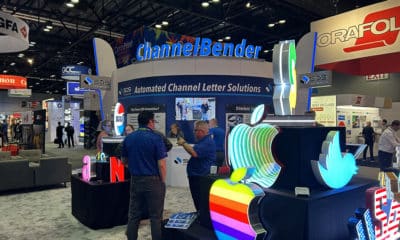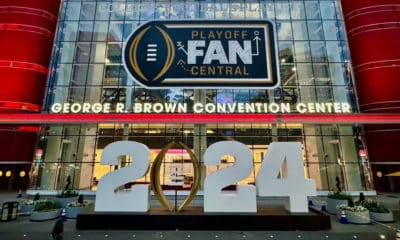
The Case of the Tax Break-down
A misleading exemption comes back to haunt this sign company.
Published
2 years agoon
ON AUG. 31, 2021, Franklin Krable sat on flight 4098 staring out the window at a red sunrise and twinkling lights below. He would soon be landing at a regional airport and getting back to his company, Krable Signs, for a meeting with management to discuss several lucrative sign orders he received while away on business. After a disastrous 2020 sustained merely by US government PPP funds, the sizable new work would be a real mood booster.
Gabe Applington, Franklin’s assistant, sat in his car waiting for Franklin at the airport pick-up area. He tapped his fingertips on his forehead — a habit of his in tense situations. In less than 10 minutes Gabe’s boss would be throwing his suitcase in the back hatch and taking a seat… only to hear some rotten company news — Krable Signs was under surprise attack: an out-of-the-blue accounting audit by tax officials from three separate states.
ABOUT REAL DEAL
Real Deal scenarios are inspired by true stories, but are changed to sharpen the dilemmas involved and should not be confused with real people or places. Responses are peer-sourced opinions and are NOT a substitute for professional legal advice. Please contact your attorney if you any questions about an employee or customer situation in your own business.
ABOUT THE AUTHOR
LAWRIN ROSEN is the president of ARTfx (Bloomfield, CT). Email him at lawrin@artfxsigns.com
Heidi Dahomey, a star salesperson at Krable, had been misled by a long-time client and well-known area builder and developer, Jeb McGraw. Apparently, Jeb had passed Heidi precarious tax-exemption forms on building improvement projects in three adjacent states. The three states participated in a reciprocal tax collecting agreement in which companies located and doing work in any one of the three states were obligated to collect and pay sales tax to the state where the work was performed.
In 2020, Jeb partially renovated three McGraw Commons shopping complexes, one in each of the three reciprocal states. He spread the work over two years due to the pandemic and subsequent labor shutdowns. Most was completed in 2020, but the paving, parking lot lighting, and pylon signs got held up until 2021. To expense by year’s end, Jeb came to Heidi in December of 2020. He was loyal and never one to quibble. Plus, he trusted Krable Signs implicitly. To benefit both parties, he even paid up front. It was money that Krable truly needed.
Heidi sold Jeb three identical pylon/tenant directory signs for exactly $180,000. Tax was forfeited because of Jeb’s claim that the exemption forms exonerated McGraw Enterprises from tax on all building improvement work. In truth, the exemptions only covered on-site labor which accounted for a mere fraction of the work. Somehow, Heidi convinced Ann Flemwyn, Krable’s CFO of many years, that the exemption certificates erased tax obligations across the board. Ann was suspicious, but Heidi had Jeb call in to reinforce the validity of his claim.
AdvertisementThe pylon work began Jan. 3, 2021. Krable’s shop knocked the three signs out quickly and they were installed in early March. As always, a few days after a major project completion, Jeb treated Heidi and Franklin to dinner at a local posh restaurant. Tragically, this time, the kind gesture took place two weeks before Jeb lost his life in a fluke corporate helicopter accident. The local community — especially contractors like Krable Signs — fell into deep mourning. McGraw accounted for a huge portion of their work.
In July, the IRS and tax agents from the tri-state area swarmed the McGraw Enterprise offices. After the deceased leader’s untimely death, serious tax anomalies came to light during a forensic audit. The problem quickly created a ripple effect throughout McGraw Enterprises’ subcontracting network. Agents spread out like hornets.
On Aug. 31, 2021, tri-state agents surprised Ann and set up temporary offices at Krable Signs to sift through two months of company billing. As a matter of procedure, the agents would search for any uncharged tax from that period, total it, and then multiply the total by three to estimate a half-year’s liability. Then, unless justly contended, the offender would be immediately liable for the entire determination.
The liability on $180,000 totaled $12,810. Another random uncharged sales tax error on a neon sign invoice generated an additional $50.75. Krable Signs’ instant tax liability totaled $12,860.75 multiplied by three (the half-year liability determinate factor) or $38,582.25.
Franklin and Gabe pulled up to Krable Signs just as the agents were handing Ann the paperwork. Unfortunately, Gabe had been too nerve-wracked along the ride back from the airport to mention anything to his boss. Now, rather than discuss exciting new business, Franklin would have to confront a major disaster firsthand.
The Big Questions
- Is Heidi or anyone else at Krable Signs at all responsible?
- Does the sign company have a legal recourse? Or can they negotiate with the tax agents?
Melvin P.
Augusta, GA
I would be calling my accountant and lawyer immediately. We have customers who claim to be tax exempt every now and then when it does not seem they should be. We always require them to submit a tax-exempt form. For a job this large I would most certainly have verified everything with my accountant and possibly my lawyer. I certainly hope Krable Signs would not be responsible, but I am just a mere sign dawg so what do I know? All that being said, this is a great example of why every business should keep an emergency fund!
Jean S.
Jacksonville, FL
I don’t know about other states but the sales tax laws in Florida are ambiguous. Having been through a sales tax audit, the question is often asked if new signage is considered [a] real property improvement and, therefore, not subject to sales tax. I’ve gotten different answers from the State. So, I just add sales tax to everything unless I get an exemption certificate from the property owner as a nonprofit or other exempt entity. It seems logical that a pylon sign would be considered real property and there might be some room for mediation in this instance. It’s hard to argue with the State though, as I found them to be unsympathetic to small businesses. But before handing over a chunk of money to the State, I would definitely argue some points on this.
John P.
Skokie, IL
Send lawyers, guns and money. The $**t has hit the fan. This is no time to try to negotiate your way out at all. Both Heidi and Ann should have known better and been more attentive to the paperwork. Having worked with this client in the past, they should have known to carefully check the paperwork. Probably not the first time this has happened, just the first time they have been caught. Krable Signs is going to need help from a legal firm that has a strong accounting and tax practice. Whether or not the legal help [will] cost more than just paying the penalty is another discussion. Once this is behind them, they need to do their own internal audit to see what else may be out of order in the accounting area. This is a great example of why we have to push customers who claim they are nonprofit or sales tax exempt (not the same thing) to produce current paperwork that we then review and keep in their file.
Frank S.
CANDIA, NH
The tax people, I fear, will close the doors of the company if not paid up.
Elaine S.
Clearwater, FL
Well, I am no tax expert but I am a common-sense expert. I would imagine both Krable Signs and McGraw have liability — Krable mainly because the CFO should have confirmed the information Heidi provided or asked Heidi for the documentation supporting her claims before they accepted payment or started work. Krable may have legal recourse and may be able to negotiate with the tax agents, but they should have vetted the situation beforehand, so I am not sure they will get much sympathy in the courts. It is also the main reason you should have an attorney and accountant on retainer. We cannot expect to be the experts in everything and the rule of thumb is if you don’t know, ask. I would rather ask questions and learn something new in advance than learn something new because of a mistake. And in this case a costly one.
What’s your Take?
Watch your inbox for our Real Deal scenarios once a month. Real Deal emails include a super-easy way to send us your feedback that takes only a minute or so. Send us your thoughts on future Real Deal scenarios and look for your name and comments here!
Not receiving Real Deal emails?
Join the ST Bulletins list at signsofthetimes.com/bulletins.

SPONSORED VIDEO
Introducing the Sign Industry Podcast
The Sign Industry Podcast is a platform for every sign person out there — from the old-timers who bent neon and hand-lettered boats to those venturing into new technologies — we want to get their stories out for everyone to hear. Come join us and listen to stories, learn tricks or techniques, and get insights of what’s to come. We are the world’s second oldest profession. The folks who started the world’s oldest profession needed a sign.
You may like

5 Reasons to Sell a Sign Company Plus 6 Options

21 Larry Albright Plasma Globes, Crackle Tubes and More

Orbus Celebrates Earth Day With Recycling Achievements
Subscribe

Bulletins
Get the most important news and business ideas from Signs of the Times magazine's news bulletin.
Most Popular
-

 Tip Sheet1 week ago
Tip Sheet1 week agoAlways Brand Yourself and Wear Fewer Hats — Two of April’s Sign Tips
-

 Photo Gallery3 days ago
Photo Gallery3 days ago30 Snapshots of the 2024 ISA Sign Expo
-

 Ask Signs of the Times5 days ago
Ask Signs of the Times5 days agoWhy Are Signs from Canva so Overloaded and Similar?
-

 Real Deal2 weeks ago
Real Deal2 weeks agoA Woman Sign Company Owner Confronts a Sexist Wholesaler
-

 Benchmarks1 week ago
Benchmarks1 week ago6 Sports Venue Signs Deserving a Standing Ovation
-

 Photo Gallery4 hours ago
Photo Gallery4 hours ago21 Larry Albright Plasma Globes, Crackle Tubes and More
-

 Women in Signs2 weeks ago
Women in Signs2 weeks ago2024 Women in Signs: Megan Bradley
-

 Women in Signs1 week ago
Women in Signs1 week ago2024 Women in Signs: Ashley Borell








